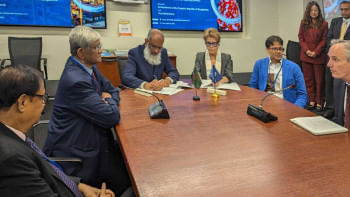Random ruminations
As one pores over the newspapers reading endlessly reports and commentaries and personal recollections of people who were associated one way or the other with some of the unfortunate victims of the Holey Artisan massacre one is inundated by multiple thoughts agitated by comments of friends and family members living far away in body but enmeshed in spirit with this land and deeply distressed by what has been happening in their beloved country of late.
It is apparent that their mind is pervaded by rueful thoughts of what has come of a land that one took pride in for its pluralistic way of life; unfortunately it was perhaps only a phantom that vanished on the fateful night of July 1 2016. Can we tell people like them with any degree of conviction that we can and will indeed not only outlast the recent episode but also the embodiments of hate and violence that the perpetrators are; that it is only a miniscule of people with jagged minds for whom religion is nothing but an admixture of warped values where cruelty dominates all actions and who are preoccupied with the marketing of violence.
One's mind is also agitated by the fact that while there has been much expression of concern at the killings and the ominous signs of ISIS footprints in Bangladesh, there has been a palpable lack of demonstration of sympathy for the dead like the kinds we witnessed for example after the Charlie Hebdo episode where 12 people were killed. There had been even more violent attacks in Turkey and elsewhere in the Middle East following Hebdo, but there was no such outpouring of solidarity in the West. I ask this question in spite of being fully certain that even in the matter of mourning for victims of terrorism and expressing our compassion there is still the 'we' versus 'they'.
One's thoughts are also troubled by commentaries in the Japanese electronic media on the killings of the seven Japanese in Holey Artisan. Why were they killed the speakers kept on asking; after all, they were in Bangladesh to help the people by participating in the development works in this country to ameliorate their condition. Why indeed were the Japanese, or for that matter the Italians, targeted, or were they? Seeking to rationalise acts of terror is odious. But to me it seems that the terrorists were in a killing spree. They were after any foreigner, not just Japanese or Italians. It just so happened that the unfortunate victims were there on that fateful day.
One's mind is also troubled by the hair splitting on the issue of the presence of IS in Bangladesh. And in this context the expression 'home grown' has gained currency. If it is any comfort to our US and European friends let me put it to them that there is as much IS in Bangladesh as there was Al Qaeda in UK after the July 7, 2005 bombings in London, there is as much presence of IS in Bangladesh as there is in the US after the San Bernadine attack there, and there is as much presence of IS in this country as there is in Belgium after the recent Brussels attack. Does it alter the fact that all of us are faced with a real threat from a phenomenon that has emerged as a result of the faulty policy of the West, particularly the US with respect to Iraq, a phenomenon that President Obama had downplayed at one time when it first emerged by suggesting that al Baghdadi was a mere pretender to the empire of al Qaeda without the actual reach of bin Laden.
And in the midst of all this one is not a little bit amused by the news that the US has offered to help build up our counterterrorism capabilities. While any offer of help to combat extremism and violence is welcome, we must be cautious of the specifics. Helping us enhance the capability of the security forces and intelligence agencies is one thing but is there much we can learn in respect of fighting the menace from a country who has very little to show by way of success in its so called global war on terror. I wonder how much a country, whose policies have spawned the recent spate of terrorism, and who, despite the vast arsenal at its possession, is still struggling to successfully combat the phenomenon, can offer us by way of advice.
One's final thoughts are that we must take lessons from the recent killings in the country and then frame appropriate policies to combat the threat we are facing. The causative factors may be influenced by external compulsions but the actors are germane to the land, and so should the countermeasures be if we are to defeat the menace.
The writer is Associate Editor, The Daily Star.

 For all latest news, follow The Daily Star's Google News channel.
For all latest news, follow The Daily Star's Google News channel. 



Comments